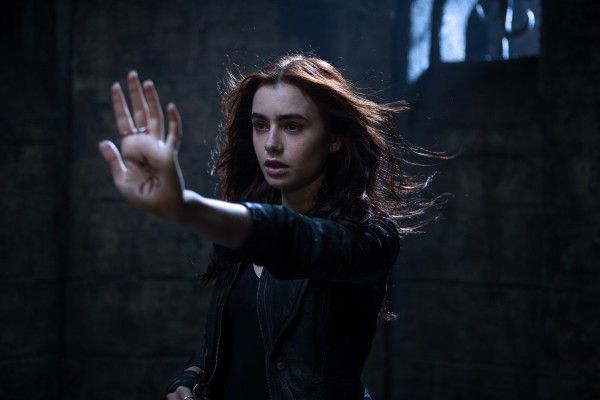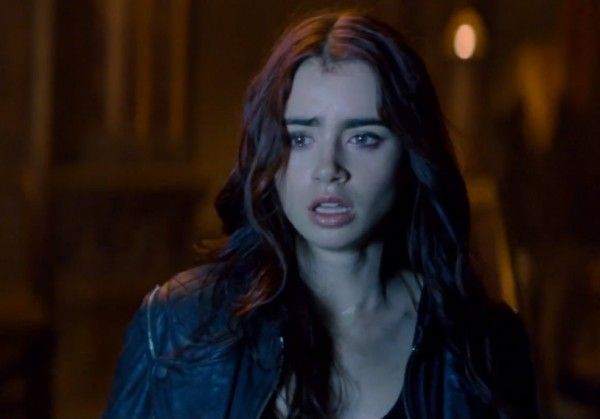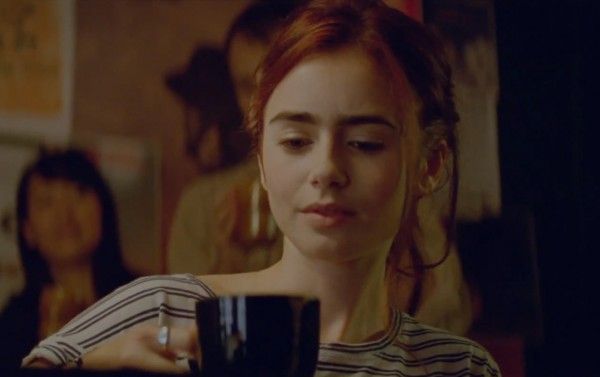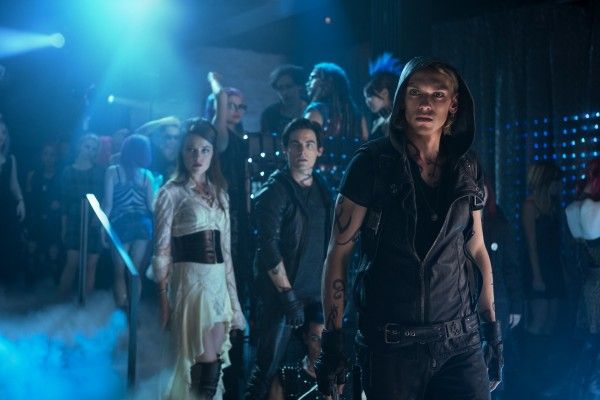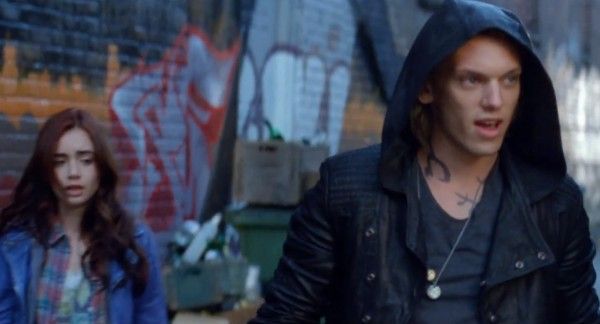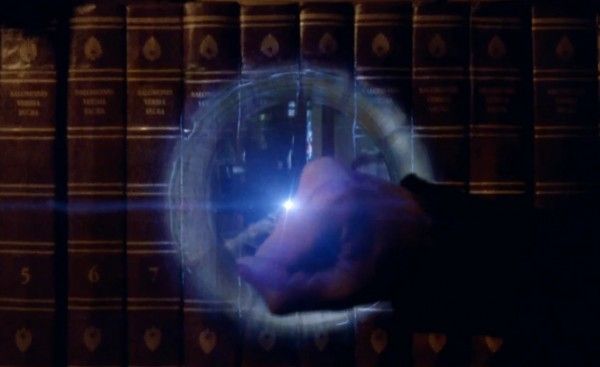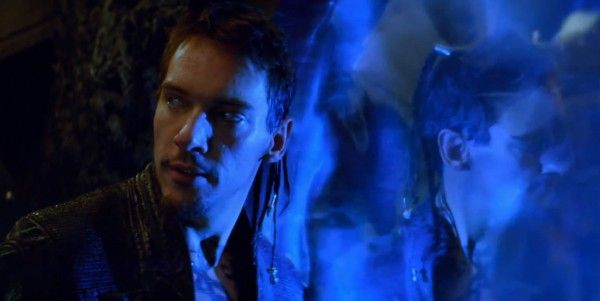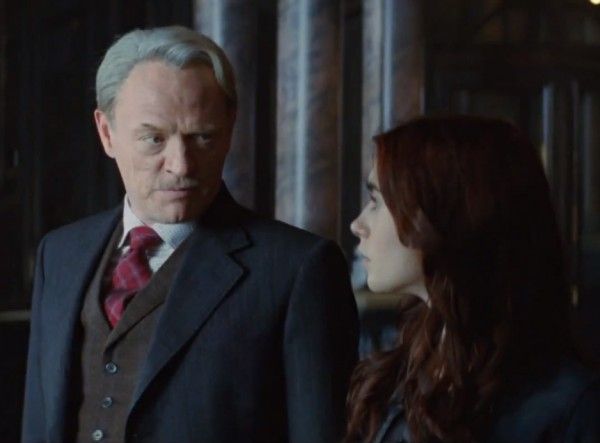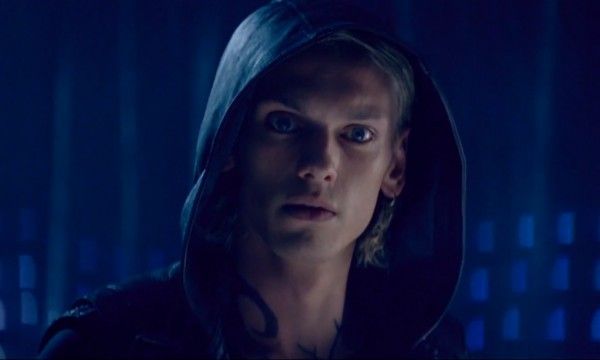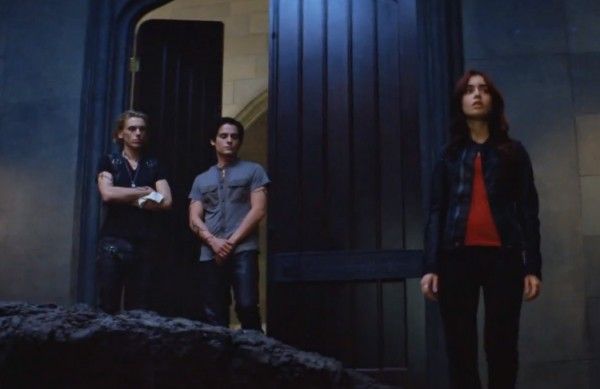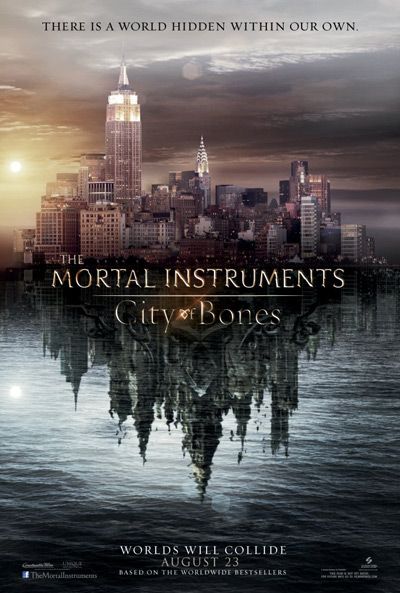Getting a movie made is never easy. And in the case of The Mortal Instruments: City of Bones, it was especially difficult. Originally set up at Warner Bros. and then at Sony, it was stuck in development hell until producers Don Carmody and Robert Kulzer decided to take a gamble on the property. Following the model they created with the first Resident Evil movie (they produced it independently and then made a deal with a studio), they had the script rewritten, got a director, and started casting. After a crazy few months, they were in pre-production and then in front of cameras.
On set last year, I got to participate in a group interview with Carmody and Kulzer. They talked about the challenges of getting The Mortal Instruments made, casting Lily Collins, the differences between Mortal Instruments and Twilight and Harry Potter, the success of The Hunger Games and how it had a female lead, deciding where to spend the money when you've got a limited budget, altering the tone of the story, and so much more. Hit the jump to either read or listen to what they had to say.
Before getting to the interview, here's the official synopsis and trailer:
The Mortal Instruments is a series of six young adult fantasy books written by Cassandra Clare. In the series’ first book, the #1 New York Times bestseller The Mortal Instruments: City of Bones, set in contemporary New York City, a seemingly ordinary teenager, Clary Fray, discovers she is the descendant of a line of Shadowhunters, a secret cadre of young half-angel warriors locked in an ancient battle to protect our world from demons. After the disappearance of her mother, Clary must join forces with a group of Shadowhunters, who introduce her to a dangerous alternate New York called Downworld, filled with demons, warlocks, vampires, werewolves and other deadly creatures.
As usual, I'm offering you two ways to get the interview: you can either click here for the audio, or the full transcript is below. The Mortal Instruments: City of Bones opens August 23.
Question: This project was originally going to go, like, two years ago. Could you talk about what it's been like actually getting this green lit and getting it going?
ROBERT KULZER: Interesting. It's just always interesting when you go on stage and there's the perfect director, the perfect cast, and I honestly mean it. The production designer, it's all falling into place, and you just go, 'Wow, how did we do that?' It's easy to forget, there's a three, four year process of getting to this point. We had a lot of luck on this movie from the beginning. The fact that the project was originally set up at Warner Brothers and until today I don't know why they let it go. My interpretation was that they were trying to find the next Harry Potter and Harry Potter is a boy, and Clary, our lead character is a girl. And I guess they went, 'Whoa, we want a boy…but, we need a boy…but, we need a boy.' And they let it go. As for doing the search to find big IP's, we came across this project, we snatched it up from Warner Brothers. There was a writer attached at the time, a young writer, and as it turns out, she is the wife of an executive at Sony, who called me right away and said, "We want this project." I went, "That's awesome." I'm basically just the middle man, the project falls into my lap, I turn it around, I give it to Sony and we have a great movie.
Obviously you find out it doesn't go so easy because we started developing and they loved the project and we kept developing and they loved the project, and [saying] "We love this movie, it's going to be fantastic, it's going to be the next Harry Potter," and then two years go by and it's "At the end of last year you said, 'Are you gonna make this movie? [and they say] "Yeah, yeah, yeah we wanna make this movie!" and it becomes January of 2012 and I sat down with my partner Martin Moszkowicz, and I said "I have a feeling we have to take the project away from Sony and do it old school like the way we did the Resident Evil movies where we fully financed them, cast them, package them, and then just make them. And he said, "Okay, let's do it." And since then, it was literally January of this year, we rewrote the script, attached a new director, started casting, and we've been on this uphill battle ever since. I said to [author] Cassandra [Clare], I said, "Listen, trust me, we'll be in production in August and she said, "Okay, okay, I trust you." I was really energized running against this deadline and we pulled it off.
DON CARMODY: Reiterating what Robert said, sometimes it just comes together. The best example I can have for it is Chicago. I was involved in the process of getting Chicago to the screen for six years through five screenwriters, four directors, etc etc. And when it all finally came together with Rob Marshall it was like magic and I feel like that's the same way here with Harald [Zwart] and the cast we've got, I've never felt as positive about this project as I am about what we're doing.
KULZER: And Harald was a big component because when I spoke to my partners in Germany I said, "You know, I just need to find a very, very great, successful director." And they said, "Yeah, sure, right." [Laughter] So you start spreading the word and there's, just like what we experienced with video game adaptations, like on Resident Evil, there's just certain people that go, "Euuugh!" There's also a little bit of that with Young Adult material, like it's some kind of a stigma. So when Harald Zwart came into my office he had a whole pile of boards with him and he said, "This is the color palate and this is what Clary looks like and this is what The Institute is going to look like and the wardrobe." I was like, "Oh my god, he's really auditioning for this part." He just did a movie that did $350 million worldwide with The Karate Kid, every studio in town wants to work with him and he really is auditioning for the job. After that meeting, I was like, "Harald, I've got a feeling you really want to do this movie" and he said, "Are you kidding me? Why do you think I put up all this shit?" It was just lucky…obviously you never know where people are in their careers, he had projects at other studios, everyone wants to work with him, why all of a sudden he says "I want to do this." He rolled up his sleeves and the last 13 months we've been working nonstop on The Mortal Instruments, but it's been a great, great process.
Can you talk about the challenges of finding the proper lead and why you ended up with Lily.
KULZER: This is, again, the history of the project has good aspects and not such good aspects. Obviously, the fact that it took so long is a bad aspect, the fact that when we were at Sony with the project they had just done a movie called Priest where she had a small role. Clint, who is our partner on The Mortal Instruments and also on the Resident Evil movies was in love with her. He said, "You know, she's gonna be big. She's the next Julia Roberts, you have to meet her." Obviously she was in a much different place at the time, she had just done two small movies, she was the second lead in Abduction with Taylor Lautner. It turned out that the postponement of The Mortal Instruments worked to our advantage because in the meantime, she'd done a movie called Mirror Mirror where she was playing with Julia Roberts, and she was equal billing with Julia Roberts. So when I went out to sell the film to the foreign distributors, I didn't have to say, "Well, it's the girl from Priest" but I could say, "Look, there's a fifty foot billboard and there's Julia Roberts and there's Lily Collins and she's the lead in my movie." In this case sticking with her, or her sticking with us, was a big advantage.
What did she bring to the role?
KULZER: She's an interesting person, she's now 23-years-old, she's hyper-intelligent. You know, obviously I don't know what her process is exactly, but she has to fall in love with the character, you know? I don't think that she would say, "I'm an actress who can play any role", the character has to speak to her. And I think from the beginning, when she started talking about Clary, she embraced the character and now I look at them — I look at the dailies — these scenes of this young, innocent girl who has no clue what's going to happen to her. Today we're shooting a scene where she's finding out her father is like the Darth Vader of The Mortal Instruments and the guy she was about to fall in love with might or might not be her brother. You can see all of this stuff in her face. The other thing that she does really well is, she emotes. It's almost like a detective story that we are telling, where she has to find out what happened to her mom and she finds out more and more about herself so there's a lot of clue and pursuit-type stuff in the movie and she does a lot of listening. A lot of the film is close-ups of Lily Collins going, "Oh my God! What's going on now?" But she does it so well and she really listens very well to the stuff that she's experiencing.
CARMODY: She's the most natural I've ever seen. There's just a truth in her performance, it's amazing. When I really first started watching her and I asked her, "Who did you study with?" And she said, "Oh, well, I went to Harvard/Wesley" and I said, "Yeah, that's high school, who did you study with?" and she said, "I've never studied." She observes and she lives the character in her own psyche. She's amazing.
KULZER: She's a regular L.A. girl off-set, does the talk and is on her iPhone, but the minute she walks on the set, it's this transformation. She's totally in the zone, she's calm, she's collected, she takes notes from the director, almost like this remote engineered something. She listens to everything, hits all her marks, we just go, like, "Oh my god, she's perfect."
What is this particular property bring to the table that will distinguish it from things like Harry Potter and Twilight?
KULZER: Well, obviously Harry Potter and Twilight are two hugely successful film franchises. We are in the seventh or eighth week of production, we don't know, we are just hoping. I think what we felt was that it has a proactive female protagonist, a young woman who goes on a journey where she goes from very relatable. In the book, she's 15, we aged her up a little bit. We felt we didn't want to a film for kids, we wanted to do a film for more of a adult audience. She goes from a sheltered, single child with an overly protective single mom in a regular New York apartment with all the regular problems of "I don't know what to do with my life, I don't have a boyfriend, I don't know what to do with my career." Then, all of a sudden, she gets yanked into this other world where she learns nothing is true about my life, about my mom's life, I see a world within a world. So it's this slow progression of taking the lead character and hopefully on the audience from here and now present day urban environment into this really, really fantastical world. Both world's kind of co-exist, which I think is a really interesting thing where we have scenes with the Shadowhunters in their cool outfits, with their blades walk through a subway in Bay Street in Toronto and regular people get out of the subway car and there's moments where these two worlds collide, which I think makes it really interesting.
Was it positive for you to see a movie like The Hunger Games be successful with a lead female? Did they inspire you to think this could be equally successful, or at least on par?
KULZER: I mean obviously it always helps when movies are successful. Especially The Hunger Games, like our film, is an independently financed film so if a film like that, or Twilight, which is also independently financed, which is another interesting side aspect. These are not movies made by the studio system, they are made by independent companies and when the Twilight series, which has done like, two-and-a-half billion dollars at the box office and The Hunger Games, which has done $800 million at the box office. When all of this cash goes back to the independent distributors, they go "That was great, now we have more money to invest in great, independent projects." It makes the greenlighting process a lot easier in our film if the only thing you compare it to is Twilight, which could be the fluke of the century, it's harder than if you say, "There's more stuff coming down the pike which has somehow slipped through the cracks of the studio system." Because somehow they haven't quite embraced the female audience yet, which is an interesting aspect in and of itself.
Whenever you pitch a project to a studio, at least that is my experience, they always go, "Oh, the young boys are going to love this! The 18 to 24-year-old boys are going to love this!" And then it turns out that the 18 to 24-year-old boys don't give a shit anymore about what the studio thinks. They go, "I'm bored, I don't want to see another monster movie, I don't want to see another CG movie." They've gone, they do other stuff, they play on the Internet, but they're not going to the movies. The most loyal audiences right now are the young girls. With social networking and going with their girlfriends and huddle and talk about who they like and don't like. The independents, in a weird way, embraced this audience much more than the studio system, I think.
CARMODY: As far as strong, independent female characters, we have some experience with that, obviously with Resident Evil movies and Silent Hill. So we believe in that.
I'm curious how the script changed when you went from being part of a studio to making it independently. You have a limited budget, what did you decide to put where with the budget?
KULZER: Some of them are intelligent choices and others are gut choices and others are just necessities of making an independent film on a budget. I think intelligently speaking we said, "We are making The Mortal Instruments, we don't make Underworld, we don't make Twilight, we don't make Harry Potter." So there's always a process when you deal with a committee or a studio where they say, "Oh great, it's like Underworld with a new girl! Instead of paying Kate Beckinsale $10 million, we pay Lily Collins $500,000 and we make a huge profit." And you have to remind them, Underworld already exists, we want The Mortal Instruments. Even that, by saying, let's read the books, let's not just look at the poster, let's try to understand what these fans like in these characters and their world. That's the most fun I had ever as a producer where you can ask [fans] questions. You can say, "Which of the characters do you like?" and you have your answer. "Which of the scenes do you like?" and there's your answer. You might not always agree with them because a book that is 500 pages would make a 10-hour movie, so you have to make choices but there was, from the beginning, a great dialogue with the fans, and obviously an important component was Cassandra Clare.
The positive about this long process — although a studio movie to be made in three years is almost a miracle — you say there are six books coming out and we now down to book number six. I wish we would have been a year earlier, but, I mean, we got to the finish line very quickly. Obviously, some of the big decisions I made in conjunction with Cassandra Clare and she went from she's the writer of these books and I'm the movie guy who makes all these terrible choices, we kinda teamed up and we said, "How are we gonna do this?" and we became really good creative friends and I think, in the meantime, we also become really good regular friends because I think there's a certain trust there. I always go, "Why would I second guess anyone when I could just pick up the phone and call her and say, 'Hey, Cassie, what about this?'" She will always have an answer, you might not always like it, but you always have an answer. So it became a really good dialogue.
There's people who say, "Oh my god, don't bring in your author, you're creating a monster." We never want to be in a situation where, one tweet and she goes "Robert Kulzer and Don Carmody ruined my movie." If she does, I want her to say, "Robert Kulzer and Don Carmody and I ruined my movie." [Laughter] I just felt like, you know what, she made up this world, she invested so much time and energy, make her part of the decision-making process. So far, it's been great, she will say, "I understand you make choices but I know the fans won't like this." So you do another circle and you think she's so convinced that you're fucking this up, then maybe you shouldn't do it.
CARMODY: The fans as well have been very interested for - in the design process even because they lived in this universe in their own minds. So it’s like what does this look like, what do their swords sort look like? It’s all on the Internet. And, you know, not that we agree hundred percent with it all but it’s interesting to see where they are going and from a design since we kind of built on some of the ideas that they put out there. So the fans are very, very passionate about this. To the point of they’re constantly, you know, showing up on the set.
Can you just elaborate on I mean there’s so much crammed into the first book from Claire’s journey to some of the, you know, the shadow hunters and the werewolves and vampires. Can you talk about some of the stuff that you debated over or some of the beats that you had to include in this book?
KULZER: Well I mean, there’s a, you know, there’s a bit of an over abundance in tone also. It is epic, it is action, it is sci-fi. It plays a little juvenile in certain parts, you know, where it has the Simon turning into a rat or the vampire bikes. We they all of a sudden there’s a scene like straight out E.T. where clarity and Jace are flying through the sky of New York on a vampire bike. Or instead of taking the subway to the cemetery, you know, they have this phenomenal carriage that takes off and flies over the - obviously as a producer I go well that’s very expensive stuff, do we really do that? And so we try to find, you know, try to tone down some of that fantastical elements. Where we say anything that’s really related to telling her story I think is very important but we need to, you know, when you have to spend $10 million on a just a transitional scene, you will probably try and lose it.
And I think it also has allowed us to sharpen the tone a little bit. So it’s a little bit more mature. I think it’s a little bit more serious. We want to keep some of the funny one-liners that all the characters have. There’s a kind of a sarcastic banter in the books that we wanted to keep. But when it gets too, you know, outlandish with the fantastical, we tried to trim it down. There was also, very much coming from Harold who said you know, I loved these books and I want to make a movie that is true to the story and the elements in the books but to be honest with you, I don’t really believe in magic. So you go well I don't believe in magic either but, you know, there's a lot of magic in the books so it became this tug-of-war where he said you know what, if she writes in the book and then she jumps into a reportable, every reader will have their own imagination what this portal looks like. Is it a big CG effective or is it a practical effect, you know? They don't think like that.
But a director says, you know, today I have to tell Lily Collins and now you jump through a portal, what is it? And then you start to talk about how much of it is scientifically approachable, what is, you know, at what point does it become a visual effects and you say well lets not even worry about it and lets have someone else figure out in post. And what do you tell the actors when they actually have to experience this? So all of these fantastical elements went through this kind of vetting process where we said how much of it can be explained? Or even is there a coherent methodology that Cassandra never thought of? She just goes, you know, anything goes. The seraph blade, I mean none of these things were connected. And obviously we spent time thinking is there a coherent logic even in the fantastical environment, is there a coherent logic behind things that we can sort of pull together. I think we came up with some really interesting stuff.
CARMODY: Yeah. And Harald as well really likes to see as much in camera as possible so that he sees it, he feels that the actors see it, they feel it as well. So it’s been a challenge in that regard.
What did you see in the property in the series that sort of got you excited and made you want to work with him?
KULZER: Well the fact that it was a number one bestseller, you know, helped. No I mean it’s really - I think Cassandra has captured the tone of a kind of slightly nerdy, intelligent, modern, young adult - female young adult. You know, where they - she talks their language the oh my God he’s cute and all this - oh my God I think I’m going to fall in love with this guy. Which is hard for us, you know, I’m a 48-year-old man so what do I care but obviously there is a gigantic energy out there of, you know, young people, especially young women, who want to idolize and who want to adore and who want to escape into this other world and spend hours and hours within the world of the novel and then with their friends and their social networking friends, discussing it and arguing it. So I think what draw us into it was really this idea that Cassandra created this very contemporary, you know, fantastical world that allows these fans too, you know, multiply and stay friends and argue forever. You know, she created a gigantic intellectual property, which obviously was a big part in us making a decision to turn it into a movie.
CARMODY: And they’re great characters and you care for them and there’s real heart line in the stories.
I’m curious how the author felt about aging the character up to appeal to more of a teenage audience? Because that actually really does change a lot because she’s in a very difficult part of her life in this stage she was a little bit younger so.
KULZER: You should ask her I mean it was, you know, it has many practical elements. To find a 15-year-old girl that is a movie star, potentially, or is a great actress is we’d talked about it. There’s just something about if you, in my opinion and there’s other people who might have a different opinion, if you are the target audience, if you are a 15-year-old girl, I don’t think you see yourself as a 15-year-old girl. I think you see yourself as a 19 or 20-year-old girl who is stuck in a body of a 15-year-old girl. And if you, if there's a certain disconnect in the book where they talk like grown-ups it’s a little bit like peanuts where, you know, where the grown-ups talk is like - and you know the world is run by 15-year-olds and it’s this kind of wishful thinking or wish fulfillment where they go if only I could run the world, the world be a better place.
And in a weird way we do that by showing these guys and we never say hey by the way I’m 21 or, you know, we keep it ageless. But I think if they see Jamie Campbell Bower, they will go on my God this is exactly the kind of man I would want to fall in love with. As a 15-year-old but, you know, if you have a 15-year-old go oh my God I want to have sex with this guy, you go to jail. So there’s a lot of practical components that you say you know what, maybe what the Cassandra was actually thinking was she’s creating the wish fulfillment version of something that, if you realize it, it’s probably Jamie Campbell Bower and Lily Collins. That’s kind of where we were coming from.
Can you talk about working with Jamie on set?
KULZER: Yeah. Interesting young man, he also stuck with us because we cast him also early on. And he again responded very, very strongly to the Jace character. Where he had a vision of this guy and he had a hard time because, you know, as much as they embraced Lily and also some of the other cast members that we cast later on, the fans immediately went love it love it love it love it. With Jace they were always a bit, oh but he's not a Jace. You know, Jamie, he's not a Jace. And he said they’d haven't seen anything yet. If you see him later on and you’ll be the judge, he has - there’s an evangelic otherworldly quality that he created that knocks your socks off. You know, I think he is emulating the character so much that obviously now I don’t even know the difference anymore between Jamie Campbell Bower and Jace. But I think he knew that he had it in him. And when we addition the two of them together, the Lily and Jamie, we felt it very strongly. We felt like whoa this is not acting, this is real stuff.
CARMODY: Obviously there’s chemistry but he also one of the hardest working kids. I mean he’s been in training for eight months.
KULZER: Eight months by now.
What scenes sorry, what scenes did they audition with? Was it the - I think I read the greenhouse scenes?
KULZER: No it wasn’t the greenhouse scene. I forget, I should know but I don’t remember. I will double check.
I’m curious when you’re making the first, of what hopefully for you guys will be a successful franchise, how’s it for signing on - obviously you don't want to make the mistake of other franchises where you sign people on for one movie and then, you know, basically there's - the hope is you’re going to make sequels. Was it tough to get certain actors knowing that I'm sure you had them sign say a six picture deal in cases this goes you know the actors that are in all the movies?
KULZER: Well I mean the deal making - I mean obviously the agencies have realized that it's big business to making this kind of franchise movies, you know, the Harry Potter kids are all multimillionaires. The Twilight kids are multimillionaires. So obviously they know that this is potentially a gigantic win fall for the agency so they know that. So whatever their values on their first movie they know it’s going to escalate. So the negotiation, even with unknown actors or relatively unknown actors, is not easy. And with the, you know, the good thing was that the way the book is laid out that a lot of the characters - again because it’s this journey, this kind of detective story, you know, a lot of the characters come in just for one sequence or one set piece and then the story moves on.
So we are actually able to say, you know, we can go for relatively well-known actors. Again in retrospect I think we got so lucky with the cast and I think we found really, really ideal candidates for all these roles. But, you know, you can go to a Jared Harris who is just, you know, been Emmy nominated and whose career is going on a big upswing. And say you know, we only need you for a couple of weeks, you know, you can be Hodge, he’s a beloved character and so, you know, you can block these guys out. But obviously for the kids, they are all run of the show and they had to make themselves that decision of, you know, do I potentially be tied up for a couple of years or, you know, potentially ten years growing up with this job. But anyway, somewhere in there is an answer I guess.
CARMODY: It’s never easy.
So when you were doing the transition between making the studio film and making it an independent financed film, how did that affect sort of the vision and the scale of the production? Because you said there was a rewrite.
KULZER: Well I mean obviously the minute we walked away from the studio world, I called Don and said have a big problem. You know, we want to do a $200 million movie for much less than that. And it's not true I mean there was, I think there was a really with Harald, there was a shift from there has to be a good story, you know, the dialogue, the drama, the charactering direction is what makes this movie. And then on top of that there will be creatures and there will be visual effects and it will be a, you know, the fantastical. But by making the adjustment, the movie actually became much more manageable. Because you say if you look at it really there's like 80 percent of the movies, a girl, and a guy and another guy and two older guys talking about stuff that happened off screen. And yes that doesn’t cost you any money, you know, that’s just people talking. Obviously now you look at the library set, which is I mean the most beautiful set I’ve ever had as a producer, you will see it in a minute, and you want to make the talking scenes interesting obviously.
But I mean with Harald it was a different challenge. He just said give me really good actors and there was some interesting choices. He was always, he always said, you know, I want CCH pounder for Madame Dorothea. He had worked with her and Don had worked with her in the past and, you know, we had this elaborate scene where Madame - just like in a book, Madame Dorothea gets taken over by a demon and then the demon burst out of her and then the demon starts kicking everyone’s ass. And it’d be like a 20 page storyboard scene and then, you know, you have this beautiful actress on the set and then she says, you know, and now I'm going to turn into a demon and all of a sudden she acts like a possessed person. We were like holy crap. I mean there is no visual effect in the world that can beat a good actress so I mean there’s still going to be a gigantic visual effect component to it but, you know, it’s a lot of fun seeing her kicking the ass of Shadow Hunters. And she does it really well. And she had fun doing it. And Harald he’s a slightly sarcastic Norwegian, he goes how much fun is that, you know, and she was awesome. The first day she was still a little bit, the make up and the lenses and, you know, and I’m CCH pounder, and what the hell. And then a second or third day she was like having such a blast.
CARMODY: She came to me and said these are all my stunt adjustments. Can you help me get into stunts Unlimited? She had a ball.
KULZER: So that’s I think where the - an independence spirit, you know, it’s just us. So when we all agree, oh my god that’s such a cool idea and we just do it. Sometimes it cost more and then sometimes hopefully will cost less but on an average I think we really improved what we wanted to do on a daily basis I think.
CARMODY: No one’s going to be disappointed in the scope of this movie. It’s - there’s some gigantic scenes and set pieces.
For more from our Mortal Instruments set visit:
- 35 Things to Know About THE MORTAL INSTRUMENTS: CITY OF BONES From Our Set Visit
- Lily Collins Talks Script Changes, the Project's Two-Year Development, Chemistry with the Cast, & More on the Set of THE MORTAL INSTRUMENTS: CITY OF BONES
- Jamie Campbell Bower Talks Fake Tattoos, Female Protagonists, Working with Lily Collins, and More on the Set of THE MORTAL INSTRUMENTS: CITY OF BONES
- Jared Harris Talks Fight Sequences, SHERLOCK HOLMES, and More on the Set of THE MORTAL INSTRUMENTS: CITY OF BONES
- Author Cassandra Clare Talks Casting, Changes from the Book, and More on the Set of THE MORTAL INSTRUMENTS: CITY OF BONES
- Director Harald Zwart Talks Collaborating with the Author, Why He Wanted to Make the Film, & More on the Set of THE MORTAL INSTRUMENTS: CITY OF BONES

